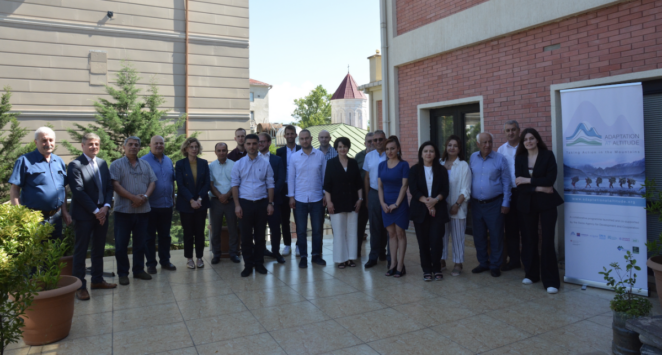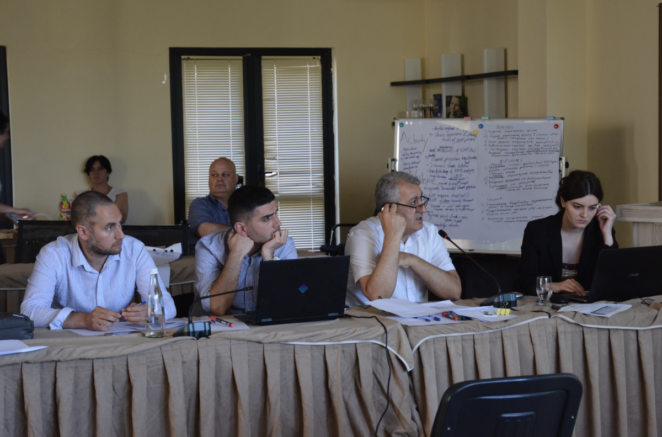Regional Adaptation Dialogue in the South Caucasus Meeting

Summary
About the meeting:
On 3rd of July 2023, the Regional Adaptation Dialogue in the South Caucasus meeting was held in Kutaisi, Georgia. The meeting was hosted by the United Nations Environment Programme (UNEP), the Caucasus Network for Sustainable Development of Mountain Regions (Sustainable Caucasus), and supported by the Adaptation at Altitude (A@A) Programme and the Swiss Agency for Development and Cooperation (SDC).
The main outcomes include
- Information about climate change risks and adaptation strategies/ policies/ plans in the South Caucasus is exchanged
- A concept for Regional Adaptation Dialogue in the South Caucasus (RADISC) is consolidated and endorsed by participants
- Input for a RADISC draft work plan is gathered and discussed
The meeting gathered more than 25 participants from Armenia, Azerbaijan, Georgia and international partners representing governments, academia, civil society, donour organizations and practice to discuss climate risks and scenarios in the South Caucasus countries, climate change adaptation policies and action, and engage in regional dialogue and collaboration for adaptation planning and implementation

Discussion points:
The meeting was opened by Nino Shatberashvili, Executive Director at Sustainable Caucasus, and Matthias Jurek, UNEP Programme Management Officer and facilitated by Ansgar Fellendorf, Climate Change and Mountain Governance Expert at UNEP. First, a brief overview of the Adaptation at Altitude and Strengthening Adaptive Capacity in the Caucasus (SCAC) programs was provided.
Next, James Thornton from the Mountain Research Initiative made a presentation about GEO Mountains: Developing an overview of mountain monitoring, data and information to support adaptation.
Following, UNEP presented the draft concept for Regional Adaptation Dialogue in the South Caucasus (RADISC). Ansgar Fellendorf and Matthias Jurek highlighted the importance of strengthening regional dialogue and collaboration to address common pressing challenges posed by climate change and to foster adaptation measures in the South Caucasus. The concept emphasizes the added value and opportunities of participation from all stakeholders, including governments, civil society organizations, and international partners.
Participants engaged in a lively discussion to provide feedback and – following clarifications e.g. on the participation of ministry representatives – orally endorsed the concept. The discussion focused on the opportunities and objectives of RADISC, such as knowledge sharing, capacity building, and possible transboundary projects.
In small group discussions input for a work plan with activities for the years 2023-2026 was provided. The participants divided into groups, each tasked with outlining specific activities and possible milestones in the next years.
Following, national climate change adaptation and sustainable mountain development policies and coordination mechanisms were presented and discussed. Each representative shared the progress made in their respective countries, highlighting policy reforms, initiatives, and achievements. The presentations provided valuable insights into the region’s efforts to integrate climate adaptation and sustainable development into national agendas.
Maia Tskhvaradze from the Ministry of Environmental Protection and Agriculture of Georgia talked about the National Adaptation Plan (NAP) process and sustainable mountain development policies in Georgia. The presentation outlined the priority resources (biodiversity, water, mountain ecosystems) and priority sectors (agriculture, tourism, health) for Georgia`s NAP.
Ani Ghukasyan from the Ministry of Environment of Armenia, addressed national climate change adaptation and sustainable mountain development policies. Ms. Ghukasyan highlighted e.g. the vulnerability of water resources to climate change and referred to the new “Sustainable and Inclusive Growth in Mountainous Armenia (SIGMA)” project funded by SDC.
Rana Humbatova from the Renewable Energy Agency of Azerbaijan highlighted the “Action Plan under the Socio-economic Development Strategy for 2022-2026 of the Republic of Azerbaijan” (July 2022), and the potential of renewable energies for more resilient development in the region. She further mentioned Azerbaijan`s process to start the development of a National Adaptation Plan.
Asif Verdiyev from the National Hydrometeorological Service of Azerbaijan talked about climate change and adaptation plans in Azerbaijan, underlining key vulnerable sectors to climate change, the impact of climate change on the runoff of rivers in the Greater and Lesser Caucasus, national climate change adaptation legislation and institutional frameworks. Mr. Verdiyev further addressed some adaptation measures for existing climate change risks.

The next item on the agenda involved identifying regional adaptation priorities for potential collaborative projects in small groups. After discussions, participants determined that water management, agriculture, as well as human settlements and natural hazards can be primary focus areas for future joint collaborative actions.
Participants played a role as both knowledge holders and knowledge recipients and actively engaged in a thought-provoking and constructive discussions to determine the future orientations of the regional adaptation dialogue.

Comments
There is no content